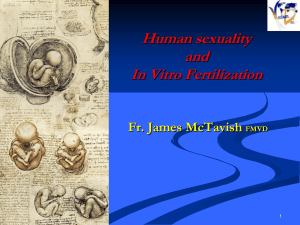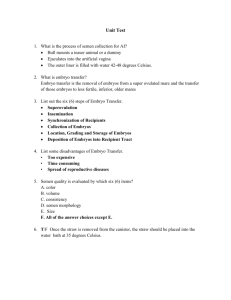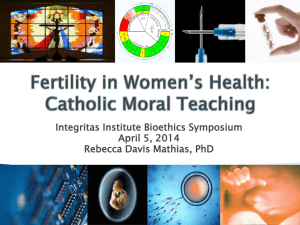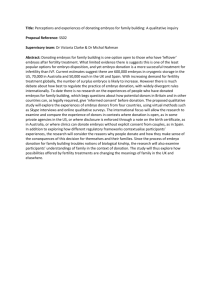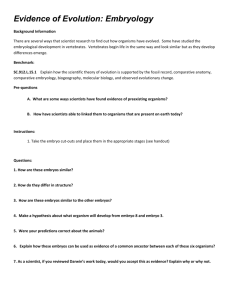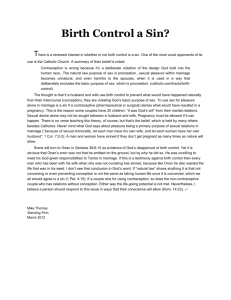REPRODUCTIVE CONTROL:
advertisement
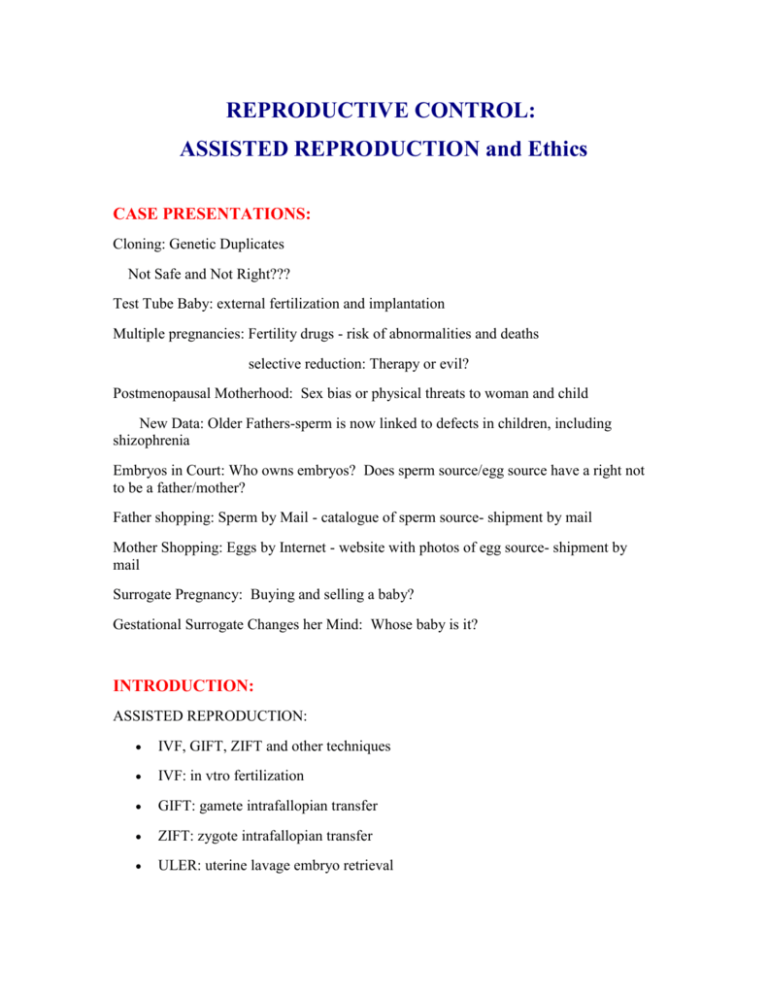
REPRODUCTIVE CONTROL: ASSISTED REPRODUCTION and Ethics CASE PRESENTATIONS: Cloning: Genetic Duplicates Not Safe and Not Right??? Test Tube Baby: external fertilization and implantation Multiple pregnancies: Fertility drugs - risk of abnormalities and deaths selective reduction: Therapy or evil? Postmenopausal Motherhood: Sex bias or physical threats to woman and child New Data: Older Fathers-sperm is now linked to defects in children, including shizophrenia Embryos in Court: Who owns embryos? Does sperm source/egg source have a right not to be a father/mother? Father shopping: Sperm by Mail - catalogue of sperm source- shipment by mail Mother Shopping: Eggs by Internet - website with photos of egg source- shipment by mail Surrogate Pregnancy: Buying and selling a baby? Gestational Surrogate Changes her Mind: Whose baby is it? INTRODUCTION: ASSISTED REPRODUCTION: IVF, GIFT, ZIFT and other techniques IVF: in vtro fertilization GIFT: gamete intrafallopian transfer ZIFT: zygote intrafallopian transfer ULER: uterine lavage embryo retrieval PZD: partial zonal dissection ICSI: intracytoplasmic sperm injection Need : 10% of US womaen are infertile, 4 million men are infertile Success rates: 24% of women treated get pregnant, 78% result in live births Costs:$10,000-$100,000, over $2 billion each year in USA Multiple Births: risk of miscarriage, defective children Freezing Embryos: > 25,000 / year are frozen in the US Gestational Surrogates and Donor Ova: postmenopausal mothers! Surrogates for convenience! Genetically superior women using genetically inferior surrogates! Criticisms of Assisted Reproduction: risks lack of effectiveness poor serving the wealthy as egg donors and surrogates Benefits of IVF and other forms of Assisted Reproduction: increases possibility of having a child ETHICAL PROBLEMS: 1. destroyed embryos 2. danger to fetus 3. eugenics 4. sex selection 5. weakening of the family CLONING TWINNING 1. selling duplicates 2. genetic copies- twins, triplets, etc........ 3. "spare" child in waiting AI: Artificial Insemination Sperm/ Egg Donation 1. Does a woman have a "right" to AI? 2. Does a woman have a "right" to select the type of sperm donor? 3. Should donors be recorded to avoid insemination by kin? Surrogate Pregnancy 1. Rich using the less fortunate? 2. Buying babies? ETHICAL THEORIES and REPRODUCTIVE CONTROL: Natural Law Theory; All techniques are wrong because they are NOT NATURAL. Utilitarian Theory: An act utilitarian might approve of al such means to provide for happiness. A rule utilitarian might oppose those techniques which when used as a rule would over time produce less welfare for members of society. Kantian Theory: Would approve in general the practice of promoting births but would be opposed to any practices which violate the categorical imperative: any procedure that treats a person as a means and not as an end in him/herself. Rawls Theory: Would favor the use of technologies that promote the liberties of those involved and would not disadvantage the least well off. the least well off must be advantaged in some way by the use of the technologies. READINGS: Congregation for the Doctrine of the Faith: Instruction on Respect for Human life FULL TEXT: click on this link http://www.priestsforlife.org/magisterium/donumvitae.htm EXCERPTS: see below Gillian Hanscombe: The right to Lesbian Parenthood Homosexual parents are entitled to the same rights as heterosexual parents. No data exists that indicates they are less responsible parents Cynthia B.Cohen: "Give me Children or I shall Die" New Reproductive Technologies and Harm to Children It is wrong to have children knowing that they will or will likely have defects, suffering, or deficits. there is no obligation to do whatever is available to have a child. Bonnie Steinbock: Surrogate Motherhood as Parental Adoption Regulating surrogacy, minimizing potential harm and protecting liberty is preferable to prohibiting the practice. Elizabeth S. Anderson: Is Women's Labor a Commodity? Commercial surrogacy should be outlawed. It is harmful to children and degrades and exploits women. It views children as property. Leon R. Kass: The Wisdom of Repugnance 1. Cloning distorts the cloned person's sense of individuality and social identity. 2. It transforms procreation into manufacture and children into commodities. 3.It encourages parents to regard children as property. National Bioethics Advisory Commission: Cloning Human Beings: ethical Considerations At present cloning lacks safety Unresolved concerns make it unwise to proceed at this time. Refuse to find cloning as inherently unethical. Susan Jacoby: Entitled to the Embryo? Selling embryos jeopardizes the value and uniqueness of all humans. DECISION SCENARIOS: 1. Cloning a replacement child 2.Reproductive Technology and risk of defective children 3. Purchasing Embryos: Babies for Sale! 4. Conditions on the use of the technology? Age limits, marital requirements? 5. Surrogate Mothers!: prostitutes? buying babies? 6. AID and an unmarried woman 7. AI and "Designer" sperm: made to order babies! 8. Selling sperm: Rights and Duties of fatherhood? 9. Fertilized eggs: To whom do they belong? Are they children? 10.Age limit on use of technologies: AID =============================================================== ========= EXCERPTS from DONUM VITAE Instruction on Respect for Human Life in Its Origin and on the Dignity of Procreation Replies to Certain Questions of the Day 4. Fundamental Criteria for a Moral Judgment The fundamental values connected with the techniques of artificial human procreation are two: the life of the human being called into existence and the special nature of the transmission of human life in marriage. The moral judgment on such methods of artificial procreation must therefore be formulated in reference to these values. 1. What Respect Is Due to the Human Embryo, Taking into Account His Nature and Identity? The human being must be respected as a person -- from the very first instant of his existence. 2. Is Prenatal Diagnosis Morally Licit? If prenatal diagnosis respects the life and integrity of the embryo and the human fetus and is directed towards its safeguarding or healing as an individual, then the answer is affirmative. 3. Are Therapeutic Procedures Carried Out on the Human Embryo Licit? As with all medical interventions on patients, one must uphold as licit procedures carried out on the human embryo which respect the life and integrity of the embryo and do not involve disproportionate risks for it but are directed towards its healing, the improvement of its condition of health, or its individual survival. 4. How Is One Morally To Evaluate Research and Experimentation on Human Embryos and Fetuses? Medical research must refrain from operations on live embryos, unless there is a moral certainty of not causing harm to the life or integrity of the unborn child and the mother, and on condition that the parents have given their free and informed consent to the procedure. It follows that all research, even when limited to the simple observation of the embryo, would become illicit were it to involve risk to the embryo's physical integrity or life by reason of the methods used or the effects induced. The corpses of human embryos and fetuses, whether they have been deliberately aborted or not, must be respected just as the remains of other human beings. 5. How Is One Morally To Evaluate the Use for Research Purposes of Embryos Obtained by Fertilization in Vitro? Human embryos obtained in vitro are human beings and subjects with rights: their dignity and right to life must be respected from the first moment of their existence. It is immoral to produce human embryos destined to be exploited as disposable "biological material." 6. What Judgment Should Be Made on Other Procedures of Manipulating Embryos Connected with the "Techniques of Human Reproduction"? Techniques of fertilization in vitro can open the way to other forms of biological and genetic manipulation of human embryos, such as attempts or plans for fertilization between human and animal gametes and the gestation of human embryos in the uterus of animals, or the hypothesis or project of constructing artificial uteruses for the human embryo. These procedures are contrary to the human dignity proper to the embryo, and at the same time they are contrary to the right of every person to be conceived and to be born within marriage and from marriage. (32) Also, attempts or hypotheses for obtaining a human being without any connection with sexuality through "twin fission," cloning or parthenogenesis are to be considered contrary to the moral law, since they are in opposition to the dignity both of human procreation and of the conjugal union. 1. Why Must Human Procreation Take Place in Marriage? Every human being is always to be accepted as a gift and blessing of God. However, from the moral point of view a truly responsible procreation vis-a-vis the unborn child must be the fruit of marriage. 2. Does Heterologous Artificial Fertilization Conform to the Dignity of the Couple and to the Truth of Marriage? Through IVF and ET and heterologous artificial insemination, human conception is achieved through the fusion of gametes of at least one donor other than the spouses who are united in marriage. Heterologous artificial fertilization is contrary to the unity of marriage, to the dignity of the spouses, to the vocation proper to parents, and to the child's right to be conceived and brought into the world in marriage and from marriage. (36) 3. Is "Surrogate" Motherhood Morally Licit? No, for the same reasons which lead one to reject heterologous artificial fertilization: for it is contrary to the unity of marriage and to the dignity of the procreation of the human person. 4. From the Moral Point of View What Connection Is Required Between Procreation and the Conjugal Act? a) The Church's teaching on marriage and human procreation affirms the "inseparable connection, willed by God and unable to be broken by man on his own initiative, between the two meanings of the conjugal act: the unitive meaning and the procreative meaning. Indeed, by its intimate structure, the conjugal act, while most closely uniting husband and wife, makes them capable of the generation of new lives, according to laws inscribed in the very being of man and of woman." (38) This principle, which is based upon the nature of marriage and the intimate connection of the goods of marriage, has well-known consequences on the level of responsible fatherhood and motherhood. "By safeguarding both these essential aspects, the unitive and the procreative, the conjugal act preserves in its fullness the sense of true mutual love and its ordination toward man's exalted vocation to parenthood." (39) Thus, fertilization is licitly sought when it is the result of a "conjugal act which is per se suitable for the generation of children to which marriage is ordered by its nature and by which the spouses become one flesh." (41) But from the moral point of view procreation is deprived of its proper perfection when it is not desired as the fruit of the conjugal act, that is to say of the specific act of the spouses' union. The moral relevance of the link between the meanings of the conjugal act and between the goods of marriage, as well as the unity of the human being and the dignity of his origin, demand that the procreation of a human person be brought about as the fruit of the conjugal act specific to the love between spouses. The link between procreation and the conjugal act is thus shown to be of great importance on the anthropological and moral planes, and it throws light on the positions of the Magisterium with regard to homologous artificial fertilization. 5. Is Homologous in Vitro Fertilization Morally Licit? The answer to this question is strictly dependent on the principles just mentioned. Certainly one cannot ignore the legitimate aspirations of sterile couples. For some, recourse to homologous IVF and ET appears to be the only way of fulfilling their sincere desire for a child. The question is asked whether the totality of conjugal life in such situations is not sufficient to ensure the dignity proper to human procreation. It is acknowledged that IVF and ET certainly cannot supply for the absence of sexual relations (47) and cannot be preferred to the specific acts of conjugal union, given the risks involved for the child and the difficulties of the procedure. But it is asked whether, when there is no other way of overcoming the sterility which is a source of suffering, homologous in vitro fertilization may not constitute an aid, if not a form of therapy, whereby its moral licitness could be admitted. 6. How Is Homologous Artificial Insemination To Be Evaluated from the Moral Point of View? Homologous artificial insemination within marriage cannot be admitted except for those cases in which the technical means is not a substitute for the conjugal act but serves to facilitate and to help so that the act attains its natural purpose. 7. What Moral Criterion Can Be Proposed with Regard to Medical Intervention in Human Procreation? The medical act must be evaluated not only with reference to its technical dimension but also and above all in relation to its goal, which is the good of persons and their bodily and psychological health. The moral criteria for medical intervention in procreation are deduced from the dignity of human persons, of their sexuality and of their origin. Medicine which seeks to be ordered to the integral good of the person must respect the specifically human values of sexuality. (55) The doctor is at the service of persons and of human procreation. He does not have the authority to dispose of them or to decide their fate. "A medical intervention respects the dignity of persons when it seeks to assist the conjugal act either in order to facilitate its performance or in order to enable it to achieve its objective once it has been normally performed." (56) Conclusion The spread of technologies of intervention in the processes of human procreation raises very serious moral problems in relation to the respect due to the human being from the moment of conception, to the dignity of the person, of his or her sexuality, and of the transmission of life. With this instruction the Congregation for the Doctrine of the Faith, in fulfilling its responsibility to promote and defend the Church's teaching in so serious a matter, addresses a new and heartfelt invitation to all those who, by reason of their role and their commitment, can exercise a positive influence and ensure that, in the family and in society, due respect is accorded to life and love. It addresses this invitation to those responsible for the formation of consciences and of public opinion, to scientists and medical professionals, to jurists and politicians. It hopes that all will understand the incompatibility between recognition of the dignity of the human person and contempt for life and love, between faith in the living God and the claim to decide arbitrarily the origin and fate of a human being.

